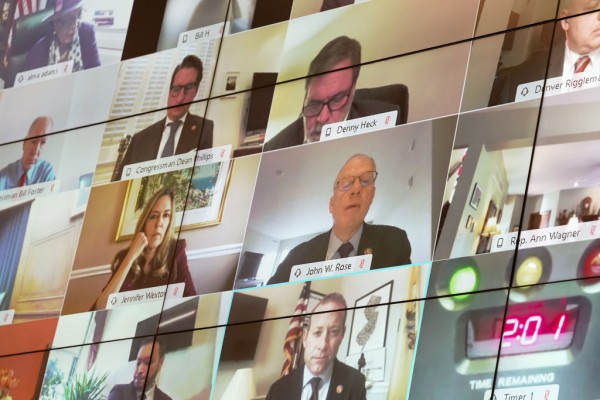Coping with the New Normal Burnout
When pandemics and lockdown surprised people from all around the world, people slowly adapt to living inside their homes for a long period.
Since strict restrictions are being imposed during the first wave of lockdown, quality time and bonding with loved ones and family became possible. Slowly, routines change and even the workplace came to adapt to the New Normal most of the people are now working and even attending classes from the comfort of their homes.
It is not surprising that people get tired of the new set up of work and education. In some cases, people get burnt-out due to their routine.
ALSO READ: 5 Ways to Stop Stress from Ruining Your Day
New Normal Burnout

Members of the House Financial Services Committee are seen via videoconference during a House Financial Services Committee oversight hearing to discuss the Treasury Department's and Federal Reserve's response to the coronavirus (COVID-19) pandemic on December 02, 2020 in Washington, DC. Federal Reserve Chairman Jerome Powell is also scheduled to testify.
According to the World Health Organization, burnout is a syndrome resulting from chronic workplace stress that has not been successfully managed. In the present workplace setting, New Normal burnout is evident.
Micaela McKenzie, a writer from Glamour shares her experience in encountering the said condition through simply living instead of commuting and packing her calendars with things to do.
This only means that Burnout does not only happen when an individual is super tired of things.
Unimed Living defines burnout as a state of physical, mental, and sometimes emotional exhaustion that is persistent or is ongoing. But the question is why do these things happen even if you are in the comfort of your homes?
In an interview with Glamour, founder of Parsley Health, Robin Berzin, MD, states that the New normal burnout is a new category in people who consider themselves healthy and able to adjust to what comes their way, making them develop a sense of exhaustion. She adds interview that the inability to turn off from 10 hours of online meetings, looking at the phone, and absorbing media from the screen is toxic to the brain, neurons, and emotional, and mental health.
READ ALSO: What is High Functioning Anxiety, and How Do You Recognize It?
How to cope with New Normal Burnout
First thing, accepting the fact that you are stressed can be the starting point, just like what Dr. Berzin says in her interview with Glamour. But there are other things an individual can do to relieve the stress and burnout they feel.
Very Well Mind shares that having a self-care assessment and strategies like eating a healthy diet, trying to have a quality and healthy sleep, and plenty of exercises may ease the exhaustion you feel. Dr. Berzin adds that prioritizing self-care helps get the body out of fight-or-flight mode a state that is known to be a sympathetic overdrive.
Help Guide mentions another method that involves the company of other people. According to the help guide, the social contract is nature's remedy to stress, and talking face to face with a good listener is one of the quickest ways to calm the nervous system and relieve stress. They emphasized that a good listener is enough, so venting out may help.
Dr. Berzin also mentions that setting boundaries on social media and find other things to do. She adds that most people cannot undergo digital detoxing because people do not what to do once they are disconnected from the online world. She emphasizes that disconnecting is a time for an individual alone.
While burnout may be tricky for an individual to get over to, responsibilities will not get away from you. Life is a cycle and picking yourself up from exhaustion should be done to continue living.
READ NEXT: Higher Depression and Anxiety Risk Linked To Low Fitness
Check out more news and information on COVID-19 and Burnout on MD News Daily
Dec 17, 2020 07:00 PM EST





